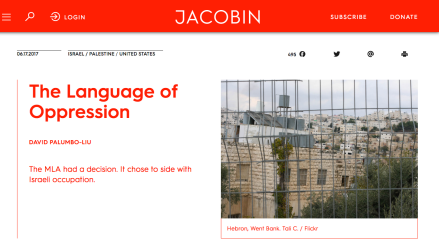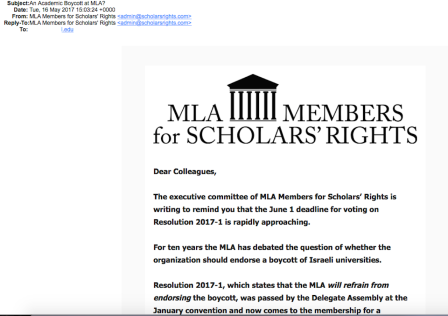Leaving the MLA: Letters of Protest
Critical Inquiry’s blog site has just posted a set of letters of resignation from the MLA in response to last year’s shameful passage of Resolution 2017-1, which sought to ban any further discussion of the boycott of Israeli academic institutions at the MLA: https://critinq.wordpress.com/2018/01/01/letters-to-the-mla/, together with Lenora Hanson and David Palumbo-Liu’s eloquent letter of resignation from the Executive Committee: https://critinq.wordpress.com/2018/01/01/lenora-hanson-and-david-palumbo-liu-why-we-resigned-from-the-mla-executive-council/
Together these letters not only make a powerful collective statement but also offer an important analysis of the ethical and political failings of the MLA as an organization with a potential public intellectual role that has been disabled by its capture by conservative forces and white supremacist ideologies for whom “professional” values are a cover for reaction. Such an analysis may help to clarify the terms for any possible reform of the association under future presidents like Judith Butler.
Those of us who have felt the need to resign from the MLA honor and respect the decision of those who have decided to stay in the association and fight to transform it. At the same time, we are very aware that there are many former members who have quietly declined to renew their membership, whether over the issue of justice for Palestine or in consequence of the MLA’s ongoing failure to address forcefully the current racist political and cultural climate in the United States and in the academy in particular.
If you are someone who has lapsed from the MLA recently, or if you are contemplating resigning from the association, please consider co-signing the letter of “non-renewal” posted below if you would like to make your resignation public in a manner that may have some impact on the MLA’s future character and commitments.
Please circulate the letter below to anyone you think would be interested. Continue reading
Protest MLA Ratification of Resolution 2017-1
On Friday, June 23, 2017, MLA Members for Justice in Palestine posted a statement protesting the MLA’s ratification of Resolution 2017-1. The anti-BDS resolution, which calls on the association to refrain from the boycott of Israeli academic institutions, was ratified as it barely reached the 10% threshold of member votes (1,954 out of 18,279 members voted in favor of the resolution) required by MLA bylaws. While the vote suggests threshold of mobilization of pro-Israeli constituencies within academia, and constitutes an upsetting setback for the academic boycott movement within the MLA, the ratification of resolution has little political significance generally, as criticism of Israel’s policies increase and support for Palestinians gathers renewed legitimacy among students and academics across the US.
Sign Statement Against Ratification of Resolution 2017-1

Upsetting, But Not Dispiriting: MLA Members Ratify Anti-Boycott Resolution
On June 14, 2017, the Modern Language Association announced the results of polling on Delegate Assembly Resolution 2017-1, which calls on the association to “refrain from endorsing the boycott” of Israeli academic institutions. Despite the effort to defeat Resolution 2017-1, it was ratified by a vote of 1,954 to 885. For a resolution to be ratified, at least 10 % of MLA members must vote in favor of it. In 2017, “[t]he number of eligible voters was 18,279, so 1,828 votes were required for ratification of the resolutions.” 
David Palumbo Liu’s “The Language of Oppression” (Jacobin July 16, 2017) provides an insightful report on the vote results.
After a series of successes, this result represents an unfortunate, but not dispiriting, setback for the academic boycott movement within the MLA. Setbacks are not uncommon for Palestinians or anyone committed to advocating Palestinian rights. Palestinians have suffered an almost endless series of defeats at the hands of the Israeli military, but affirm their right to exist in Palestine, forging a remarkable culture of resistance that stands in opposition to Israel’s ruthless colonialism.
MLA Members for Justice in Palestine remains committed to promoting Palestinian literature and culture, advocating Palestinian human rights, and working with other academics in opposing injustice. The group is exploring how best to respond to this setback and will soon be issuing a public statement.
The struggle continues . . .
“An Outrage and a Betrayal”: Tim Brennan Statement against MLA Resolution 2017-1
Click to VOTE NO on Resolution 2017-1.
Voting on MLA Resolutions ends at Midnight on Thursday June 1, 2017.
Click this link to sign the petition against MLA Resolution 2017-1.
Read the A Statement of Past Presidents of the MLA on Resolution 2017-1
Timothy Brennan is a professor of Comparative Literature, English and American Studies at the University of Minnesota. He is also affiliated with the Institute for Global Studies and the Institute for Advanced Studies. He is the author of Secular Devotion: Afro-Latin Music and Imperial Jazz (Verso, 2008), and edited, introduced, and co-translated the first English edition of Alejo Carpentier’s classic study, Music in Cuba (U of Minnesota P, 2001). Other books include Borrowed Light, Vol. I: Vico, Hegel and the Colonies (Stanford UP, 2014), Wars of Position: The Cultural Politics of Left and Right (Columbia UP, 2006), Empire in Different Colors (Revolver, 2007), At Home in the World: Cosmopolitanism Now (Harvard UP, 1997), and Salman Rushdie and the Third World: Myths of the Nation (Macmillan, 1989). He was named Russell Chair in the Humanities in 2014. He has chaired the Sociological Approaches to Literature Division of the Modern Language Association (MLA). His essay (co-written with Doug Rossinow) on the Israel/Palestine conflict was the featured article on Yahoo.com in 2003.
Resolution 2017-1, which suppresses debate over Israel within the MLA and, indeed, is intended to prevent any public statement by the organization critical of the Israeli state is itself an outrage and a betrayal, of course, of everything the MLA nominally stands for. I recall seeing signs of this kind of cynicism and political intolerance in the MLA earlier as a member of the Delegate Assembly during the debate over Ward Churchill. It is a mood very much in the spirit of the United States’ more general rightward turn, but now taken up enthusiastically, it appears, by a frustrated sector sick-and-tired of critical thought, angry at its own professional disenfranchisement, and eager to get revenge on the humanities’ earlier progressive commitments.
Added to this, of course, is the very faux-patriotically American desire to support Israel whatever it does, insulated from any of the criticisms that even supporters of this proposal would normally mount against other states. This effort to censor — and even to render permanently invalid – the richly deserved condemnation of Israel’s violations of international law and its unspeakable treatment of Palestinians, is disgraceful, and would embarrass the organization in the eyes of many here and abroad.
Many of us – I know I am not alone – have been long disenchanted with the MLA’s overpaid administrative staff (who apparently are in their positions for life), the unconscionable cost for students and faculty to attend its annual convention, the relative lack of intellectual substance or discussion at this convention, and the cliquishness of its publishing organs and official hierarchy. The MLA has an opportunity to redeem itself by defeating this proposal. Why should we remain in the organization if it does not?
Duthu and Dartmouth: More Attacks against Academics who Support Palestinian Rights
Pro-Israeli Scholars’ Rights Group Spams MLA Membership, Violates Association Privacy Policies
MLA Members for Scholars’ Rights, lead by Russell Berman and Cary Nelson, is a small group of academics that Israeli agencies and pro-Israel lobby organizations in the US have endorsed in the battle against academic boycott. Scholars’ Rights came into existence primarily to oppose MLA Members for Justice in Palestine and seeks single-mindedly to undermine solidarity with Palestinians among academics. Behind its shallow liberal discourse on academic freedom, the Scholars’ Rights group engages in all manner of misinformation and misrepresentation to defend Israel from growing public criticism.
To garner support for the anti-boycott Resolution 2017-1 that Russell Berman  and Martin Shichtman proposed at the MLA Convention, and is currently subject to a members’ ratification vote, Scholars’ Rights launched a massive email campaign on Tuesday May 16, spamming a large segment of the MLA membership. The nature and format of the May 16 email, which was sent possibly to several thousand MLA members reveals the suspect ethical character of this pro-Israel group. Continue reading
and Martin Shichtman proposed at the MLA Convention, and is currently subject to a members’ ratification vote, Scholars’ Rights launched a massive email campaign on Tuesday May 16, spamming a large segment of the MLA membership. The nature and format of the May 16 email, which was sent possibly to several thousand MLA members reveals the suspect ethical character of this pro-Israel group. Continue reading
“Misleading or Flatly False”: Tim Reiss’s Statement Against MLA Resolution 2017-1
Timothy J. Reiss is Emeritus Professor of Comparative Literature at New York University. His most recent books are Against Autonomy: Global Dialectics of Cultural Exchange (2002), Mirages of the Selfe: Patterns of Personhood in Ancient and Early Modern Europe (2003) and the edited collections Music, Writing and Cultural Unity in the Caribbean (2005) and (co-ed.) Topographies of Race and Gender: Mapping Cultural Representations (2008-9). He is currently finishing a book on Descartes and his age’s political practice and thought, another on rethinking the Renaissance as part of long continental and oceanic intercultural exchanges, and an edited collection on Ngugi wa Thiong’o. See also his earlier statement in support of an academic boycott of Israel.
I am making a statement asking our membership to vote no on Resolution 2017-1 because it strikes me as so egregiously against everything the MLA represents. The resolution itself, that we refrain from endorsing “the boycott,” is a nonsense. As things currently stand, the MLA endorses no boycott. Within the framework of the MLA, therefore, there is nothing from which to refrain. Why are we having a vote at all on something non-existent? That we have supported boycotts and other forms of “political” action in the past does, however, show that every space possible must always be left open for debate within the MLA. To assert, as this Resolution does, that the one case preemptively never open for debate is that of Israel is simply to put the MLA on public record as endorsing some special status for Israel. Whatever one may think of the merits of BDS in particular (as a political intervention on behalf of academic freedoms the MLA most definitely claims to further) and of the MLA’s political role in general, such an endorsement surely exceeds any conceivable MLA interest.
Does the MLA really wish to go on record as promoting Israeli academics’ freedoms while denying those of Palestinian academics?
Click this link to VOTE NO on Resolution 2017-1.
Voting on MLA Resolutions: April 19-June 1.
Click this link to sign the petition against MLA Resolution 2017-1.
The Right to Boycott Israel and the Culture Wars
In a recent article titled “The Palestinian Litmus Test,” published online at Jadaliyya, David Lloyd, Distinguished Professor of English at the University of California, Riverside, writes about the current MLA membership vote on the anti-boycott Resolution 2017-1.  Lloyd explains the context of the MLA ratification vote in the following manner:
Lloyd explains the context of the MLA ratification vote in the following manner:
After three years of unprecedentedly open debate, the membership of the Modern Language Association’s (MLA) membership is finally voting on the Palestinian call to endorse a boycott of Israeli academic institutions. Voting continues through May. Unlike other organizations that have considered the issue, however, the MLA is not voting on whether or not to boycott. Instead, we are voting on a resolution (2017-1) that would commit the association not to endorse the boycott, even though a pro- boycott resolution—having been rejected by the Delegate Assembly in January—is no longer even on the table. To resolve not to endorse a non-existent resolution may seem a somewhat redundant exercise. But proponents of 2017-1 hope that passing their resolution will be the final nail in the coffin of a national movement for academic boycott—a movement whose capacity to rise from setbacks stronger than before has proven quite remarkable. They seek to close off debate on the issue within the MLA permanently, and by doing so, to send a signal to other associations that the matter is settled.
As noted elsewhere on this site, Resolution 2017-1, which was proposed by Russell Berman (Stanford University) and Martin Shichtman (Eastern Michigan University), aims to shield Israel from institutional critique by delegitimating the Boycott, Divestment, and Sanctions (BDS) movement and discrediting advocacy in support of Palestinian human rights.
